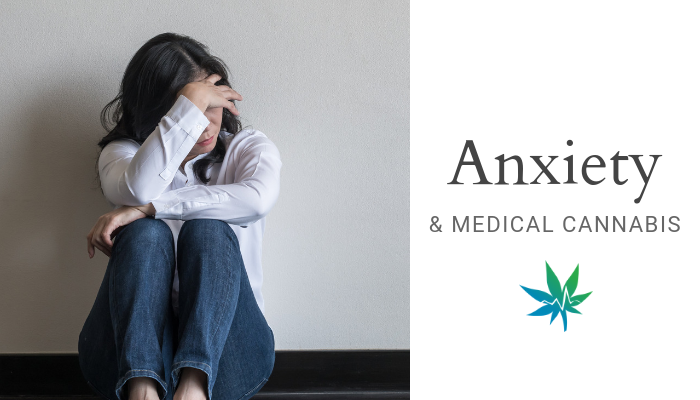Most people experience a bit of worry in their day to day lives. Whether it’s from wondering whether or not traffic will be heavy, anticipating a big work deadline or feeling a bit nervous about an upcoming blind date.
But the reality is, there are currently 3 million Canadians that live in a constant state of excessive worry and anxiety. These individuals suffer from a condition known as Generalized Anxiety Disorder (GAD).
Today, we explore how anxiety disorder is being treated and how medical cannabis can be an anxiety medication alternative for those looking for a natural remedy.
What is Anxiety Disorder?
When does worrying becoming a problem?
To individuals that live with GAD, every situation can be anticipated in a “worst case scenario” kind of way. The constant fear of disaster or “what-if” situations can result in debilitating anxiety attacks. This perpetual state of worry can impact their personal and professional lives.
In addition to stressful (and often, unprovoked) anxiety, individuals with GAD can experience a myriad of other symptoms that are associated with mental health disorders. The following can accompany feelings of constant worry and distress:
- Muscle tension
- Headaches
- Difficulty sleeping
- Digestive upset
What Causes Chronic Anxiety?
The exact cause of GAD is unknown. However, there are factors that have been identified that contribute to the likelihood an individual will develop this disorder.
Research supports a genetic component to experiencing anxiety, and women are more likely to develop the disorder than men. There is also evidence that trauma or a stressful life situation can trigger the onset of GAD.
How to Cope with Anxiety
Cognitive-behavioural Therapy (CBT) for Treating Anxiety
Cognitive-behavioural therapy (CBT) can be a useful tool for those with anxiety disorder as it helps identify behaviours that trigger anxiety. CBT also teaches the individual to recognize unhealthy patterns, and provides them with tools to change these thought processes.
Unfortunately, only 20% of Canadians who report having a mood disorder seek psychological counselling to help treat their symptoms.
Treating Anxiety with Pharmaceuticals
93% of Canadians reach for prescription drugs to help treat their anxiety disorder.
Since it is believed that an imbalance of serotonin and norepinephrine can contribute to an individual developing GAD, prescription drugs to help balance these neurotransmitters are often thought of as the best course of action. However, the types drugs prescribed for GAD (specifically benzodiazepines) can be highly addictive. They are recommended for short term treatment. Additionally, these drugs can have adverse side effects including confusion, muscle weakness and stomach problems.
It is also important to note that medications designed to alter neurotransmitter activity can also impact other parts of the nervous system unintentionally. Since the communication between the brain and the body is so complex, altering the level of one neurotransmitter may cause a shift in the levels of other neurotransmitters. This can cause a vicious cycle of modifying prescriptions as frustrated patients seek out ways to treat new symptoms that arise after they begin treating their anxiety with pharmaceutical drugs.
Is There a Safe Way to Self-Medicate?
With so many people reporting anxiety and stress in their everyday lives, it is not surprising that many patients turn to drugs and alcohol in an attempt to manage their mental health. Research demonstrates a link between anxiety, alcohol and drug use, with many people self-medicating on a routine basis.
With the legalization of marijuana in Canada, more and more Canadians are experimenting with cannabis for anxiety treatment.
A recent study published by Washington State University in the Journal of Affective Disorders found that smoking cannabis can significantly reduce self-reported levels of anxiety and depression. However, the results did not lead to long term success, and in many cases, the levels of depression experienced increased over time.
We believe the results from this study could have ended in more positive long-term outcomes if the participants had received support and guidance from medical professionals.
Although medical cannabis is a powerfully healing plant, there are many factors that can affect a patient’s experience, such as
- Dosage
- Strain
- Timing of ingestion
- Patient’s’ medical history
- Patients current medication
Receiving help from a trained physician can help individuals correctly identify, diagnose and treat other conditions that could be impacting their mental health.
How Does Cannabidiol (CBD) Impact Anxiety?
Currently, there are several animal studies that have demonstrated the efficacy of cannabidiol (CBD) in improving certain types of brain activity. Although these results may not reflect perfectly the impact of cannabinoids in the human body, they are strong indicators that there are positive outcomes in treating anxiety with medical cannabis.
The benefits of CBD in treating anxiety appears to be associated with a few different processes that occur within the brain.
Firstly, CBD may increase signaling through serotonin receptors. As mentioned earlier, an imbalance in serotonin can result in an increased likelihood of developing anxiety. CBD mimics the effects of Selective Serotonin Reuptake Inhibitors (SSRIs) in the sense that they help the brain transmit more serotonin signals, which can have an anxiety reducing effect in some cases.
Another area of the brain that is often associated with anxiety is the hippocampus. This organ is part of the limbic system, an area of the brain plays that plays an important role in regulating emotions. The size of the hippocampus and growth of new cells (neurogenesis) in this area have been linked to mood and anxiety disorders.
A study using mice found repeated administration of CBD may help the hippocampus regenerate neurons, which could be useful for treating anxiety or depression. Additional research shows both SSRIs and CBD may promote neurogenesis, so future discoveries on this promising link could shed new light on how we understand and treat mood disorders with medical cannabis.
Seeking Anxiety Relief in Calgary
The best way to know if medical cannabis can help you manage your GAD symptoms is to come in for a medical consult with a physician at one of our clinics here in Calgary.
Appointments for Alberta residents are free and covered by Alberta Health Services. Prior to your medical consultation with one of our licensed physicians, you will be educated on how medical cannabis works in our body and how it reacts to our endocannabinoid system.
During your education session with a Cann-Expert, you will learn:
- The main differences between an Indica, Sativa, and Hybrid strain
- Benefits of THC, CBD, and Balanced strains
- Our unique Endocannabinoid Systems (ECS)
- Timing of inhalation vs ingestion
At the time of your consultation, your Revolution Medical Cannabis doctor will review you medical history and ensure that cannabis will not conflict with any medications you’re currently taking. They will then prescribe the best medical cannabis treatment plan for you. Our team will guide you in selecting a license producer as well the registration.
Treating mental health is a multidisciplinary approach; your doctor may also refer you to a psychologist.
Ask for medical cannabis for anxiety – proper administration can improve your quality of life
At our Calgary clinics, we have helped countless of Calgarians suffering from chronic anxiety.
Our caring team of educators and physicians can help you navigate the many anxiety relief options out there. Through proper counsel and guidance, we can determine if medical cannabis is for you.
Schedule Your Next-Day Appointment
Are you ready to explore the benefits of medical marijuana? Contact Revolution Medical Cannabis today and schedule your free appointment with a cannabis educator and physician.


